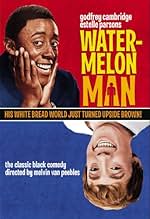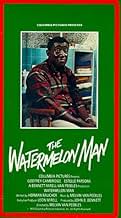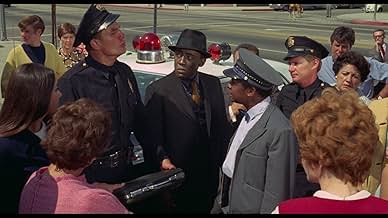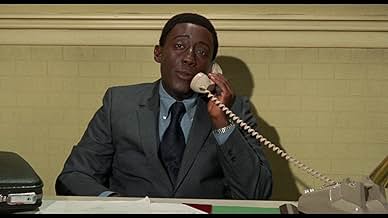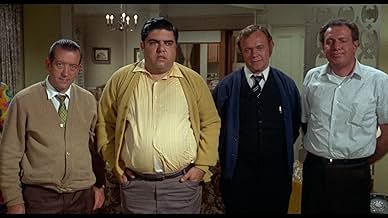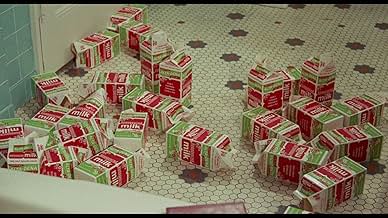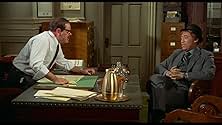AVALIAÇÃO DA IMDb
6,7/10
3,1 mil
SUA AVALIAÇÃO
Adicionar um enredo no seu idiomaJeff Gerber, a racist white man, wakes up one morning to discover that he has become black.Jeff Gerber, a racist white man, wakes up one morning to discover that he has become black.Jeff Gerber, a racist white man, wakes up one morning to discover that he has become black.
- Direção
- Roteirista
- Artistas
- Indicado para 1 prêmio BAFTA
- 1 vitória e 1 indicação no total
Paul Williams
- Employment Office Clerk
- (as Paul H. Williams)
Avaliações em destaque
In Watermelon Man, director Melvin Van Peebles expresses complex ideas about race and racism in a sophisticated but humorous way. At that, however, if you do not have a strong taste for grotesques--in a formal sense ("outlandish or bizarre; ludicrous or incongruous distortion")--you may not enjoy the film as much as I did. It is something of a surreal, occasionally psychedelic caricature, but as such, it does what all good caricature should do--it emphasizes the truth without being strict realism or "naturalism".
Watermelon Man is the story of Jeff Gerber (Godfrey Cambridge). He's something of a strange dweeb who nevertheless has a stereotypical white-bread suburban existence. He's got a wife, two preadolescent kids, a nice home with a manicured lawn, and so on. He's also something of a health nut (although humorously, Cambridge wasn't exactly in great shape when they shot the film). As the film opens, he's busy exercising while his wife is trying to capture a few more minutes of sleep. He regularly uses a sun lamp. He takes the bus to his insurance salesman job, but instead of catching it right down the street, he races it through the neighborhood every day, the goal being to beat it to the last stop before it gets on the highway.
Jeff presents himself as happy-go-lucky and quite a joker, but he's a bit obnoxious and boorish, plus he shows himself to be racist and a male chauvinist, although he's not exactly gung ho about sleeping with his wife.
Just as we're learning about Jeff's routine, something unusual happens--he wakes up in the middle of the night as a black man. At first he thinks it's a nightmare, but it doesn't go away. He blames it on the sun lamp. He blames it on food he's ingesting. The bulk of Watermelon Man has Jeff trying to at first conquer, then later deal with his newfound "problem".
If you've seen both films, you might find it odd that Van Peebles made Watermelon Man before Sweet Sweetback's Baadasssss Song (1971). Unlike Sweet Sweetback, which is intriguing in its own way, but not near as good of a film artistically and technically, the direction in Watermelon Man is finely nuanced and sophisticated, the cinematography is crisp and attractive and technical elements such as sound are superb. I suppose this might be an interesting lesson in how crucial budget and "legitimacy" can be for film-making. It gives access to the finest materials and resources, including a large stable of professionals with narrow specialties. At that, however, Watermelon Man is not nearly as respected now as Sweet Sweetback because of what Sweet Sweetback represents, both ideologically and influentially in the film industry. Sweet Sweetback was something of a revolutionary (and very psychedelic) cry for African-American rights, and it helped launch not only the blaxploitation craze of the 1970s, but also fiercely independent film-making.
Yet, Watermelon Man is just as unique and important in what it has to say about race, even if it's not violent or pornographic, and not bizarre in the same way. Once Jeff becomes black, everything about his life changes. There isn't a person around who doesn't relate to him differently, with many having a polar opposite reaction to him--both his white friends (and family, of course) and his black acquaintances (they weren't friends, exactly, when Jeff thought he was white). Everyone wants to exploit his newfound state, including his boss. Van Peebles makes a sly transition from the beginning to the end of the film that goes from white-bread sitcom to something of a militant blaxploitation flick in a way that you barely even notice.
A large part of what makes Watermelon Man so odd is Godfrey Cambridge. His performance is way over the top and consistently bizarre, but for some of us, in some contexts (such as for me in this context), this kind of bizarre, over the top material works extremely well--in fact, I tend to prefer this to realism. The other performances are at least interesting, even if they're not all good in a conventional wisdom evaluation, but Cambridge really carries the film.
Equally bizarre and a bit disturbing is Cambridge's make-up as a white man. The make-up is extremely well done--it's difficult to picture Cambridge as he really looks underneath it all, but given the character's disposition, Cambridge as a white man comes off as freakish to say the least.
Van Peebles' direction is extremely admirable. He's not afraid to take all kinds of thrilling chances, including such unusual moves as quick pans to go from character to character in a conversation and odd intrusions of psychedelia, such as the scene that suddenly starts flashing different negative exposure images, or the scene that stops to insert commentary that resembles silent film intertitles.
Van Peebles also did the music here, as he did in Sweet Sweetback, and it's just as weird. Near the end of the film, there's an extended version of a song that rips-off "Heard It Through The Grapevine" that features a vocal that even The Residents would raise an eyebrow to. Again, I love weird stuff, so I was happier than a pig in, um, mud.
If there's anything less than satisfactory about Watermelon Man, it's that it engenders sadness that Van Peebles wasn't able to talk the helm more often. He made a controversial move in this film by changing the ending in the original script, as he rightfully should have done (Columbia originally wanted an "it was all a dream" ending, which would have been ridiculous and insulting, to say the least), and that, combined with his independent production of Sweet Sweetback the following year, didn't exactly put him on Hollywood's successful brownnoser list.
Watermelon Man is the story of Jeff Gerber (Godfrey Cambridge). He's something of a strange dweeb who nevertheless has a stereotypical white-bread suburban existence. He's got a wife, two preadolescent kids, a nice home with a manicured lawn, and so on. He's also something of a health nut (although humorously, Cambridge wasn't exactly in great shape when they shot the film). As the film opens, he's busy exercising while his wife is trying to capture a few more minutes of sleep. He regularly uses a sun lamp. He takes the bus to his insurance salesman job, but instead of catching it right down the street, he races it through the neighborhood every day, the goal being to beat it to the last stop before it gets on the highway.
Jeff presents himself as happy-go-lucky and quite a joker, but he's a bit obnoxious and boorish, plus he shows himself to be racist and a male chauvinist, although he's not exactly gung ho about sleeping with his wife.
Just as we're learning about Jeff's routine, something unusual happens--he wakes up in the middle of the night as a black man. At first he thinks it's a nightmare, but it doesn't go away. He blames it on the sun lamp. He blames it on food he's ingesting. The bulk of Watermelon Man has Jeff trying to at first conquer, then later deal with his newfound "problem".
If you've seen both films, you might find it odd that Van Peebles made Watermelon Man before Sweet Sweetback's Baadasssss Song (1971). Unlike Sweet Sweetback, which is intriguing in its own way, but not near as good of a film artistically and technically, the direction in Watermelon Man is finely nuanced and sophisticated, the cinematography is crisp and attractive and technical elements such as sound are superb. I suppose this might be an interesting lesson in how crucial budget and "legitimacy" can be for film-making. It gives access to the finest materials and resources, including a large stable of professionals with narrow specialties. At that, however, Watermelon Man is not nearly as respected now as Sweet Sweetback because of what Sweet Sweetback represents, both ideologically and influentially in the film industry. Sweet Sweetback was something of a revolutionary (and very psychedelic) cry for African-American rights, and it helped launch not only the blaxploitation craze of the 1970s, but also fiercely independent film-making.
Yet, Watermelon Man is just as unique and important in what it has to say about race, even if it's not violent or pornographic, and not bizarre in the same way. Once Jeff becomes black, everything about his life changes. There isn't a person around who doesn't relate to him differently, with many having a polar opposite reaction to him--both his white friends (and family, of course) and his black acquaintances (they weren't friends, exactly, when Jeff thought he was white). Everyone wants to exploit his newfound state, including his boss. Van Peebles makes a sly transition from the beginning to the end of the film that goes from white-bread sitcom to something of a militant blaxploitation flick in a way that you barely even notice.
A large part of what makes Watermelon Man so odd is Godfrey Cambridge. His performance is way over the top and consistently bizarre, but for some of us, in some contexts (such as for me in this context), this kind of bizarre, over the top material works extremely well--in fact, I tend to prefer this to realism. The other performances are at least interesting, even if they're not all good in a conventional wisdom evaluation, but Cambridge really carries the film.
Equally bizarre and a bit disturbing is Cambridge's make-up as a white man. The make-up is extremely well done--it's difficult to picture Cambridge as he really looks underneath it all, but given the character's disposition, Cambridge as a white man comes off as freakish to say the least.
Van Peebles' direction is extremely admirable. He's not afraid to take all kinds of thrilling chances, including such unusual moves as quick pans to go from character to character in a conversation and odd intrusions of psychedelia, such as the scene that suddenly starts flashing different negative exposure images, or the scene that stops to insert commentary that resembles silent film intertitles.
Van Peebles also did the music here, as he did in Sweet Sweetback, and it's just as weird. Near the end of the film, there's an extended version of a song that rips-off "Heard It Through The Grapevine" that features a vocal that even The Residents would raise an eyebrow to. Again, I love weird stuff, so I was happier than a pig in, um, mud.
If there's anything less than satisfactory about Watermelon Man, it's that it engenders sadness that Van Peebles wasn't able to talk the helm more often. He made a controversial move in this film by changing the ending in the original script, as he rightfully should have done (Columbia originally wanted an "it was all a dream" ending, which would have been ridiculous and insulting, to say the least), and that, combined with his independent production of Sweet Sweetback the following year, didn't exactly put him on Hollywood's successful brownnoser list.
8tavm
Continuing to review African-Americans in film in chronological order for Black History Month, we're still in 1970 when director Melvin Van Peebles makes his first major studio feature having previously done a critically acclaimed independent one called Story of a Three Day Pass. He casts comedian Godfrey Cambridge as Jeff Gerber who we initially meet as an obnoxious white insurance man-along with wife Althea (Estelle Parsons) and their two kids of different genders-who likes to run when leaving for his job in order to beat the bus. By the way, the light-skinned makeup on Cambridge is about as convincingly white on him as it was on Eddie Murphy in the "White Like Me" short film he did on "Saturday Night Live", that is, not much. Anyway, when the change comes, well, that's when all hell breaks loose! Now, knowing what I know about ironic humor concerning stereotypes, I found the whole thing just a little over-the-top and, you know what? I also found the whole thing hilarious! I mean, how can you not laugh at the attempts Godfrey keeps making to turn himself "back" like drinking lots of milk or putting his face in plaster. Plus, there's many funny sudden turns from now-"brothers" like the bus driver played by D'Urville Martin who claims to be Hispanic or Mantan Moreland as the counterman at his regular eatery who, when asked to look at his skin, says, "I don't need to look at your skin, I can see my own!" And wait till you see how Three Stooges regular supporting player Emil Sitka reacts when he gets attacked by Jeff over some new sunlamps! Not to mention Jeff's bed scenes with a flirtatious secretary named Erica (Kay Kimberly). I think I've said enough so all I'll say now is that Van Peebles provides much funny stuff from Herman Raucher's script in addition to his own contributions with his occasionally distorted score. So on that note, Watermelon Man comes highly recommended. P.S. It's quite interesting seeing who's also in this movie besides those I've already mentioned like singer/songwriter Paul Williams-here credited with the middle initial H-as an employment clerk or a young girl named Erin Moran-later to portray the teen Joanie Cunningham on "Happy Days"-as daughter Janice Gerber.
I first saw this film on television about 7-8 years ago. It was part of a "Heritage Network" movie special. This was hosted by Ruby Dee and Ossie Davis. I fell in love!!! I had to own this film!!! How much were they holding the film hostage for???? $20 dollars??? $100 dollars?? And so I waited for a few years. My father would keep saying to me "Aren't you going to buy that movie?" I'd say "Yeah Soon", but just didn't want to cough up the cash for it. Then it finally arrived on DVD in 2004 or so. I purchased it at Media Play. And I have watched it several times. I think that it's ahead of its time. Godfrey Cambridge plays a very disciplined white man with a nice white family. He puts on his sneakers and runs down the hill as exercise racing with the bus. Just the like the Yuppies of the 80's that wore sneakers to work then changed shoes. He was doing this in 1969.. He was an insurance man and he believed in exercise, family, all the values that this country was raging against in 1969. Then he wakes up one day and is black. All the showers in the world can't wash off the color. His whole universe changes. Some for the worse, some for the better. I have a whole new respect for Godfrey Cambridge from this film. A highly intelligent man in real life, Godfrey lets this shine through in this film. Especially poignant is when he is selling insurance to young black families. He talks straight to them, and doesn't patronize them. You will see this in the film. No hard sell, No baloney. Another tidbit that you will find interesting is that the house interior they used is the same one that they used for another famous television family.....THE PARTRIDGE FAMILY!!!!!! There is a small barely audible directors commentary with the film, and you have to listen carefully to really understand it. Seems that the film company did not treat Mr. Van Peebles very nicely. And I am putting this nicely as i can. Anyway it's a gem of a movie!!!!
"Watermelon Man" might throw off quite a few people with its style of cinema. It's a work of the grandfather of American independent film, Melvin Van Peebles, and with that should come a certain measure of respect. Van Peebles may not have produced dozens of films, but he certainly turned the industry on its head 30 years ago. This is an interesting arrangement on the business side- hot off the European success of "The Story Of A Three Day Pass", Warner Brothers takes on filmmaker Van Peebles for a feature film. The story of Van Peebles versus the company in filming is a conte in itself, but the film remains poignant and striking in its cinematography and theme. Aggressive editing of both film and musical inserts highlight the subtle comedy and pure desperation of the story of a bigot who wakes up Black and watches the world turn against him.
It's something of a manic ride, but Cambridge gives it all the human character it can stand. His antagonist-cum-protagonist role gives you 360 degrees of frustration and forced humility. Van Peebles presses the more unreal moments into a sub-psychedelic form. Printed messages, color fills, choppy eye-effecting shots and that insistent score remind you that this absurdity is all too real. But ongoing themes such as "He stole something.. we don't know what yet," are darkly hilarious as is Cambridge's sharp wit.
"Watermelon Man" is serious film that will still make you laugh at times. This is not the kick-in-the-establishment-a** that "Sweetback" is, but it's an important step on the way. Alongside films such as "Cotton Comes To Harlem" (also with the superb Cambridge) and "Putney Swope," this is an important part of the early end of the Black film explosion.
Look for cameos by songwriter-actor Paul Williams as an employer and Melvin Van Peebles himself as a painter. Black cast staple (and director of "Dolemite") D'Urville Martin is also on hand as a bus driver in some of the film's funniest scenes.
It's something of a manic ride, but Cambridge gives it all the human character it can stand. His antagonist-cum-protagonist role gives you 360 degrees of frustration and forced humility. Van Peebles presses the more unreal moments into a sub-psychedelic form. Printed messages, color fills, choppy eye-effecting shots and that insistent score remind you that this absurdity is all too real. But ongoing themes such as "He stole something.. we don't know what yet," are darkly hilarious as is Cambridge's sharp wit.
"Watermelon Man" is serious film that will still make you laugh at times. This is not the kick-in-the-establishment-a** that "Sweetback" is, but it's an important step on the way. Alongside films such as "Cotton Comes To Harlem" (also with the superb Cambridge) and "Putney Swope," this is an important part of the early end of the Black film explosion.
Look for cameos by songwriter-actor Paul Williams as an employer and Melvin Van Peebles himself as a painter. Black cast staple (and director of "Dolemite") D'Urville Martin is also on hand as a bus driver in some of the film's funniest scenes.
First - WHO's Godfrey Cambridge?!?! Yeah - he was a comedian. And a VERY funny one. Sigh.
OK, now that I've said that, let me make a couple of things understood. A lot of people who've written comments about this are either too young to remember the 60's/70's or are trying to relate to this film from today's perspective.
This film was written/directed by Melvin Van Peebles, who - at the time - was (and, by some - unfortunately) considered a 'controversial (black) artist. Second; yes, the makeup is not as good as the wonderful job done on Eddie Murphy in various films/skits, or the Wayans' brothers, but - for the make-up tech of the day - it was VERY good (look at the scene in the beginning when Godfrey's exercising (naked!), and then going to the shower. I just watched it on HD, and it still holds up VERY well (and as an aside; I saw this film first when I was about 10 - on TV. I thought upon seeing it that REALLY was a white man who became black. So, just remember that while you might not think his make-up's up to snuff now, it sure did convince an earlier generation).
Understanding when this film was made, the 'situation' of race relations at the time, and the ability for a (black) artist like Mr. Van Peebles to MAKE this film is necessary in understanding how shocking this film was - in all those areas.
Yes - the film's a bit dated (but who isn't?). But watching this film - and understanding what I've just explained makes it all the more extraordinary. Alex P (miskatonic86), and Definitedoll (just to name a couple) are some of the few who understand this film's importance.
Mr. Cambridge is/was one of the best comics. His 'babbling' - or more accuratley, his riffing on a subject was part of his stand-up style (if you'd like to see Godfrey not as a 'babbling' person, but as a (slightly ominous - and funny) character, check him out in THE PRESIDENT'S ANALYST, or in COTTON COMES TO HARLEM. , amongst other appearances.
He's sorely missed, by me and many others who've seen him either on such shows as ED SULLIVAN, THE MERV GRIFFIN SHOW CAR 54 WHERE ARE YOU, THE DICK VAN DYKE SHOW, I SPY amongst MANY other shows. If not, you can see this huge talent's work on YouTube (YouTube's a GREAT resource for educating yourself about not current performers and artists. It's NOT just a place to look at ...cat's playing pianos, and other garbage).
As a glimpse (by a black artist!) into the 'white man's world,' and the world in general - at that time - Mr. Van Peebles should be given his deserved recognition (and Godfrey, we miss you!).
OK, now that I've said that, let me make a couple of things understood. A lot of people who've written comments about this are either too young to remember the 60's/70's or are trying to relate to this film from today's perspective.
This film was written/directed by Melvin Van Peebles, who - at the time - was (and, by some - unfortunately) considered a 'controversial (black) artist. Second; yes, the makeup is not as good as the wonderful job done on Eddie Murphy in various films/skits, or the Wayans' brothers, but - for the make-up tech of the day - it was VERY good (look at the scene in the beginning when Godfrey's exercising (naked!), and then going to the shower. I just watched it on HD, and it still holds up VERY well (and as an aside; I saw this film first when I was about 10 - on TV. I thought upon seeing it that REALLY was a white man who became black. So, just remember that while you might not think his make-up's up to snuff now, it sure did convince an earlier generation).
Understanding when this film was made, the 'situation' of race relations at the time, and the ability for a (black) artist like Mr. Van Peebles to MAKE this film is necessary in understanding how shocking this film was - in all those areas.
Yes - the film's a bit dated (but who isn't?). But watching this film - and understanding what I've just explained makes it all the more extraordinary. Alex P (miskatonic86), and Definitedoll (just to name a couple) are some of the few who understand this film's importance.
Mr. Cambridge is/was one of the best comics. His 'babbling' - or more accuratley, his riffing on a subject was part of his stand-up style (if you'd like to see Godfrey not as a 'babbling' person, but as a (slightly ominous - and funny) character, check him out in THE PRESIDENT'S ANALYST, or in COTTON COMES TO HARLEM. , amongst other appearances.
He's sorely missed, by me and many others who've seen him either on such shows as ED SULLIVAN, THE MERV GRIFFIN SHOW CAR 54 WHERE ARE YOU, THE DICK VAN DYKE SHOW, I SPY amongst MANY other shows. If not, you can see this huge talent's work on YouTube (YouTube's a GREAT resource for educating yourself about not current performers and artists. It's NOT just a place to look at ...cat's playing pianos, and other garbage).
As a glimpse (by a black artist!) into the 'white man's world,' and the world in general - at that time - Mr. Van Peebles should be given his deserved recognition (and Godfrey, we miss you!).
Você sabia?
- CuriosidadesMelvin Van Peebles: The artist who letters Jeff Gerber's new office door.
- Erros de gravaçãoDr. Wainwright asks Jeff if he knows that the first man to die in an American war was Crispus Atticus. The man's name was actually Crispus Attucks, NOT Atticus. The doctor puts in an extra syllable.
- Citações
Delivery Man: That guy needs a sun lamp like Fred Astaire needs dancing lessons.
- ConexõesFeatured in The Real Deal: What It is (2003)
- Trilhas sonorasLove, That's America
Written and performed by Melvin Van Peebles
Principais escolhas
Faça login para avaliar e ver a lista de recomendações personalizadas
- How long is Watermelon Man?Fornecido pela Alexa
Detalhes
Bilheteria
- Orçamento
- US$ 1.000.000 (estimativa)
- Tempo de duração1 hora 40 minutos
- Mixagem de som
- Proporção
- 1.85 : 1
Contribua para esta página
Sugerir uma alteração ou adicionar conteúdo ausente

Principal brecha
By what name was A Noite em que o Sol Brilhou (1970) officially released in India in English?
Responda

